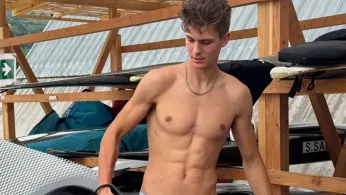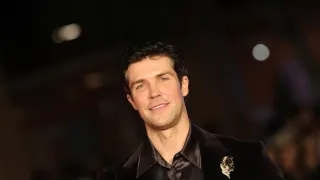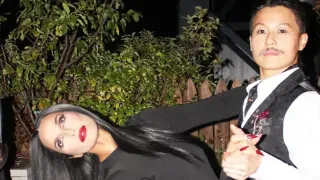
7 hours ago
From Racing Shells to Racy Shells: British Rower Kurts Adams Rozentals Makes Waves on OF After Ban
READ TIME: 18 MIN.
In the world of competitive rowing, it’s all about precision, discipline, and keeping your eyes on the finish line. But for Kurts Adams Rozentals—a British rower whose Olympic aspirations were abruptly dashed after a racy video surfaced—the story took an unexpected turn from the waterways to the World Wide Web. Now, as Rozentals makes a splash on OnlyFans, his journey is not just a story of personal reinvention, but a lens through which we can view the intersection of sports, queerness, and the politics of bodies in the digital age .
It began with a video. According to reporting from Queerty, Rozentals was banned from rowing competition after a racy clip—details undisclosed but described as “adult content”—appeared online. The decision not only sidelined him from his sport but also forced Rozentals to make a deeply personal and professional choice: continue chasing Olympic glory, or embrace a new path that celebrates his body and agency on his own terms .
For Rozentals, the answer was clear. “I’m being forced to choose between OF & the Olympics,” he told reporters, referencing OnlyFans by its now-iconic abbreviation. “But honestly, I’m making way more than I ever did rowing.” . The statement is equal parts candid and cutting—laying bare the economic realities many LGBTQ+ athletes face, especially when their identities and sexual expression clash with the buttoned-up world of elite sports.
Rozentals’ pivot to OnlyFans is more than a career move; it’s a microcosm of the broader conversation about queer bodies, autonomy, and respectability politics. For decades, LGBTQ+ athletes have felt pressured to hide or downplay their sexuality, gender expression, or even just their bodies, lest they run afoul of sporting codes or public opinion. When those same athletes claim their own narrative—especially in spaces that celebrate sexual expression—they’re often punished, policed, or pushed out.
The rower’s experience isn’t unique, but his candor is refreshing. LGBTQ+ athletes have long faced scrutiny for stepping outside rigid boundaries—even when those boundaries are drawn with invisible ink. The question isn’t just about “what’s appropriate,” but who gets to decide, and why those rules seem to land hardest on queer and marginalized bodies. Rozentals’ decision to lean into his sexuality and capitalize on his image, rather than shrink from shame, is a power move in a world that too often expects LGBTQ+ people to apologize for simply existing.
“Why is it that straight athletes can pose for calendars, but a queer or sex-positive athlete gets shown the door?” ponders one fan on social media, echoing a sentiment shared by many following the story .
Rozentals’ OnlyFans debut is not an isolated phenomenon. The rise of platforms like OnlyFans has opened up new avenues for LGBTQ+ people to express themselves, build communities, and even earn a living on their own terms. For many, it’s a radical act of reclaiming agency in a world that often commodifies queer bodies while simultaneously shaming them for it.
The economics are undeniable. Rozentals himself admits he’s “making way more” now than he did in his rowing days—a reality that highlights the structural inequities in sports funding, sponsorship, and the treatment of LGBTQ+ athletes . By choosing to monetize his image on his own terms, Rozentals is subverting the traditional power dynamics of both sport and media.
For many queer fans, this is not just a story about a racy video or a sports ban. It’s about seeing someone like Rozentals refuse to be shamed, refuse to shrink, and refuse to let institutional gatekeepers dictate the boundaries of his self-expression.
The LGBTQ+ community response has been swift and passionate. Online, Rozentals has become something of a folk hero—admired not just for his athleticism, but for his unapologetic embrace of sex-positivity and queer autonomy. LGBTQ+ media outlets have rallied to his side, with many commentators framing his story as emblematic of the challenges and triumphs faced by queer athletes worldwide.
“Kurts is showing us that you don’t have to play by their rules,” wrote one columnist on an LGBTQ+ sports blog . “He’s rewriting what success looks like for queer athletes.”
For queer youth and aspiring athletes, Rozentals’ story is both a cautionary tale and a beacon of hope. It’s a reminder that while the world may not always be ready for you, you can still carve out space on your own terms—and, sometimes, make a living doing it.
Rozentals’ bold new chapter is a signpost for the future. As sports institutions grapple with changing social norms, and as queer athletes demand not just tolerance but celebration, the lines between public and private, professional and personal, are being redrawn in real time.
What remains clear is that stories like Rozentals’ are no longer anomalies—they’re harbingers. The digital age has made it harder than ever to police queer bodies and identities, and easier than ever for LGBTQ+ people to build power, visibility, and community on their own terms.
As the ripples from Rozentals’ story spread outward, the LGBTQ+ community—and the broader world—are left with a provocative question: What would it look like if we stopped punishing queer athletes for their power, and started celebrating them for it?






